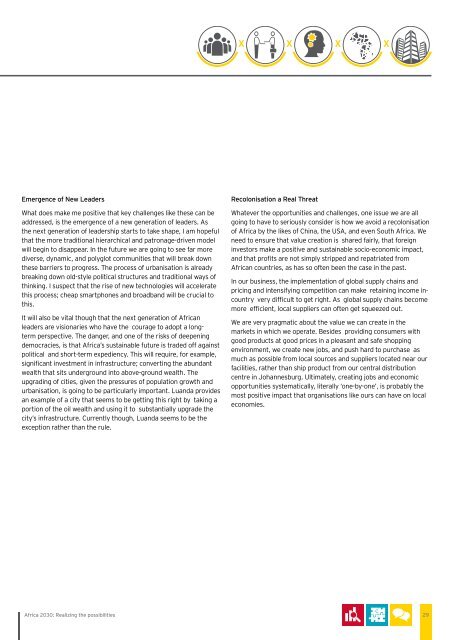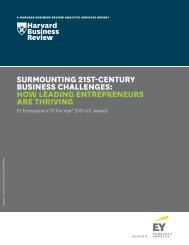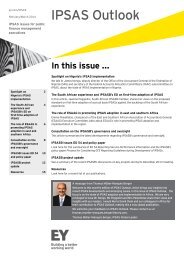Create successful ePaper yourself
Turn your PDF publications into a flip-book with our unique Google optimized e-Paper software.
Emergence of New LeadersWhat does make me positive that key challenges like these can beaddressed, is the emergence of a new generation of leaders. Asthe next generation of leadership starts to take shape, I am hopefulthat the more traditional hierarchical and patronage-driven modelwill begin to disappear. In the future we are going to see far morediverse, dynamic, and polyglot communities that will break downthese barriers to progress. The process of urbanisation is alreadybreaking down old-style political structures and traditional ways ofthinking. I suspect that the rise of new technologies will acceleratethis process; cheap smartphones and broadband will be crucial tothis.It will also be vital though that the next generation of Africanleaders are visionaries who have the courage to adopt a longtermperspective. The danger, and one of the risks of deepeningdemocracies, is that Africa’s sustainable future is traded off againstpolitical and short-term expediency. This will require, for example,significant investment in infrastructure; converting the abundantwealth that sits underground into above-ground wealth. Theupgrading of cities, given the pressures of population growth andurbanisation, is going to be particularly important. Luanda providesan example of a city that seems to be getting this right by taking aportion of the oil wealth and using it to substantially upgrade thecity’s infrastructure. Currently though, Luanda seems to be theexception rather than the rule.Recolonisation a Real ThreatWhatever the opportunities and challenges, one issue we are allgoing to have to seriously consider is how we avoid a recolonisationof Africa by the likes of China, the USA, and even South Africa. Weneed to ensure that value creation is shared fairly, that foreigninvestors make a positive and sustainable socio-economic impact,and that profits are not simply stripped and repatriated fromAfrican countries, as has so often been the case in the past.In our business, the implementation of global supply chains andpricing and intensifying competition can make retaining income incountryvery difficult to get right. As global supply chains becomemore efficient, local suppliers can often get squeezed out.We are very pragmatic about the value we can create in themarkets in which we operate. Besides providing consumers withgood products at good prices in a pleasant and safe shoppingenvironment, we create new jobs, and push hard to purchase asmuch as possible from local sources and suppliers located near ourfacilities, rather than ship product from our central distributioncentre in Johannesburg. Ultimately, creating jobs and economicopportunities systematically, literally ‘one-by-one’, is probably themost positive impact that organisations like ours can have on localeconomies.Africa 2030: Realizing the possibilities29





